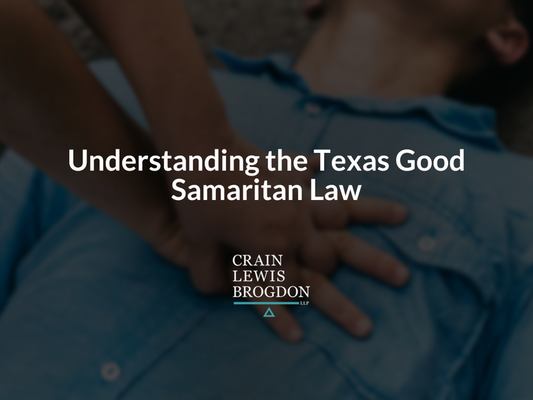
Witnessing a traumatic accident while it’s occurring can be frightening. If the police or paramedics haven’t arrived yet, you should call for help, but what do you do if you know a victim is suffering and needs immediate attention? If you feel that you can help the victim and save them from more severe injuries, you can step in as a rescuer. The Texas Good Samaritan law will protect you.
If it weren’t for the Texas Good Samaritan Act, rescuers who aren’t professionals might be hesitant to help victims in need. After all, there’s a chance that you might cause the person further injury or that they could even die while you’re trying to help. Fortunately, this law is designed to give some grace in some situations like these.
At Crain Lewis Brogdon, LLP, we’re proud to help Good Samaritans who are doing what they can to assist others. If you inadvertently injured someone while trying to help them after a traumatic accident, a personal injury lawyer in Dallas can help you sort through the legal issues involved and move forward with your life.
The point of the Texas Good Samaritan Act is to encourage citizens to help their neighbors in need. The law only applies, however, when a rescuer is acting in good faith. As long as it can be proven that the rescuer was acting in good faith, then the law protects rescuers from being sued by the victim if the rescuer accidentally causes further injuries to the victim.
An example of the Good Samaritan law is when a victim gets into a car accident and the car is on fire. A rescuer may try to pull the victim from the fire. If the victim suffers burn injuries during the rescue because of the rescuer’s actions, the rescuer may not be held liable. Some other examples where a rescuer may act in good faith include when delivering a baby, performing CPR, or administering an epinephrine pen.
The court evaluates Good Samaritan cases one by one. Because it's hard to determine whether the rescuer acted reasonably and in good faith, the court must use their own judgement. Sometimes, a rescuer’s actions can be dangerous and irresponsible, and the law won’t protect them.
If you were brave enough to intervene in an accident and attempt to rescue an injured victim, then you may be protected by Texas law for any injuries you unintentionally caused. You didn’t have to put yourself in harm’s way, and the point of the Good Samaritan law is to make sure you’re not penalized for the good deed you attempted to perform.
If you want to discuss your case in greater detail with a Dallas personal injury lawyer from Crain Lewis Brogdon, LLP, call 214-522-9404 to schedule a no-obligation consultation, or visit our website for more information.
If you suffered a serious personal injury, you have an important choice: finding an attorney who can not only fight for your rights but help you recover the financial compensation you truly deserve. At Crain Lewis Brogdon, LLP, we know that finding the best Dallas personal injury lawyer can seem like a huge challenge. That’s why our team provides legal guidance that truly sets us apart from the competition. We don’t just represent our clients; we work to give them a full understanding of their legal rights and options.And if you find yourself in trouble with the criminal section of the law, we can help! If you've been charged with a crime, a Dallas criminal lawyer... View full business profile here: Crain Lewis Brogdon, LLP
